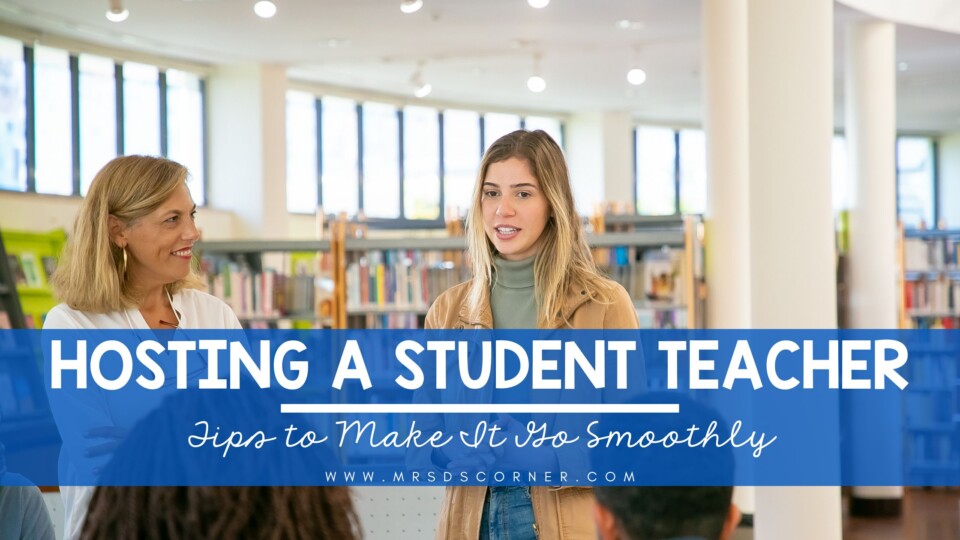Student teaching can be an exciting and nerve-wracking time – for both the student and the cooperating teacher!
If you are hosting a student teacher this year, here are 17 teacher-tested tips to make it go smoothly.


Student Teacher Hosting Tips
1 – Be Welcoming
Make sure that your student teacher knows that she is welcome in your classroom. Give her a space of her own and be generous with your inclusion of her in the classroom and the school. Introduce her to other teachers, take her on a tour of the school, and make her feel like she is part of the team.
2 – Be Kind
Don’t just preach about kindness to others, demonstrate it. Be kind to your student teacher, show respect, and, if you need to discuss something with her, don’t do it in front of the students or other staff members.
3 – Adjust Your Expectations
Rethink your expectations for your student teacher. Remember, that she is coming from a program and has very limited time in the classroom. Bookwork is a lot different than actual teaching. Her student teaching is going to be mostly on-the-job training!
4 – Be Tactful
Honesty goes a long way and you should strive to be honest with your student teacher about her performance, but also about teaching in general. Don’t sugar coat things, but be tactful. If a lesson fell short, chances are she already knows that and is feeling disappointed in herself. Help her process what went wrong, but focus on things she did well and areas where she could easily improve.
5 – Be Specific with Expectations
If your student teacher doesn’t know what you expect from her, she will never be able to live up to those expectations. Be specific and clear about what you want her to do, when, and how. The clearer your expectations, the less anxiety she will feel trying to anticipate what you want and the better she will perform.
6 – Share Your Lesson Plans
Being put into a classroom for student teaching can be overwhelming. Make sure your student teacher knows what’s going on by sharing your lesson plans with her. Not only will it help her get a sense for the structure and rhythm of the day, but it will also give her an example of “real-life” lesson plans that may be very different from those she wrote in her courses.


7- Let Them Collaborate on IEPs
Involve your student teacher in your IEP writing. Show her how it is done at your school, how you organize everything, and let her make suggestions or ask for her ideas. This will make her a better teacher in the long-run and will improve her confidence and understanding of what is involved with an IEP.
8 – Make an Extra Copy
Make an extra copy of all of the materials that you use throughout each week. If you’re using worksheets with your students, make an extra copy for your student teacher. This will help build up her resource file and give her ideas for when she has her own classroom or caseload.
9 – Have Them Attend IEP Meetings
If you are going to an IEP meeting, have your student teacher attend and observe. It is important for her to see as many different types of IEP meetings as possible so that when she has to hold them for her students she has an understanding of how they should run and issues that might come up.
10 – Teach Them How to Collect Data
Collecting data can be challenging for veteran teachers let alone for student teachers. Show her different ways to collect data and what to do with it after it has been collected. Giving her practice now will make her a stronger teacher after she graduates.
11 – Take Lots of Pictures
Make your student teacher feel special by taking a lot of pictures of her teaching and working with students throughout her time in your classroom. They will be cherished memories that she’ll look back on with fondness.
12 – Be Encouraging
It’s easy to point out the negative, but when you’re working with your student teacher, point out the positive. Be encouraging and uplifting. You are her first real exposure to life in the classroom and she needs to hear you say that she can do it. Encourage her daily.
13 – Gradual Responsibility to Independence
Start by assigning small tasks and gradually increase their responsibilities as they become more comfortable. The ultimate goal is to help them be independent. That means gradually giving them more to do and cheering them on throughout the process.
14 – Schedule Regular Meetings
Set consistent times for check-ins to discuss progress, challenges, and strategies moving forward.
15 – Help with Classroom Management
Share strategies for managing classroom behavior effectively, as this is often a challenge for new teachers. They need to know your tricks and tips for getting classes engaged and keeping them on task.
16 – Encourage Questions
Just like with anything new, you don’t know what you don’t know until you realize you don’t know! Encourage your student teacher to ask questions. If it’s something that she has a question about in the middle of a lesson, have her jot it down and ask later. There are no dumb questions!
17 – Encourage Reflection
After each lesson, set aside time to discuss what went well and what could be improved, allowing the student teacher to guide the conversation. Allowing them time to reflect on their lessons helps them become better teachers.
Student teaching is not easy, but having a student teacher is also challenging. Take care of yourself while nurturing the future teacher in your midst and get excited about the new ideas you can learn from her. It’s an opportunity for both of you to grow!

